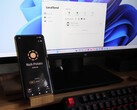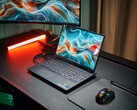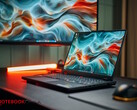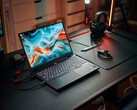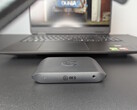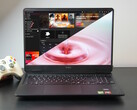Brilliant OLED panels are usually reserved for mid- to upper-tier gaming laptops, yet Lenovo includes them even in its more affordable models. Particularly striking is the use of OLED in the reasonably priced €1,499 Legion 5 16 with RTX 5070 ($1.650 on Amazon).
Even the slightly pricier Pro version at €1,799 sports an OLED screen. Considering its added features over the standard model, the price jump feels justified — and for a laptop with creator-focused ambitions, it’s actually quite a deal.
Most direct competitors in this price range, such as the Gigabyte Aero X16, Asus TUF Gaming A16, XMG Core 16, or Gigabyte Gaming A16, still rely on IPS panels of varying quality. With its vibrant OLED display, the Legion series stands out clearly from the pack.
So what makes OLED such a great fit for both gamers and creators? Alongside its 2,560 × 1,600 resolution, 165 Hz refresh rate, really fast response times, and brightness above 400 nits, it’s the impressive color coverage that seals the deal. Not only does it cover both sRGB and Display P3 almost completely, but it also reproduces an impressive 94 percent of the more demanding AdobeRGB space.
| Lenovo Legion Pro 5 16IAX10, RTX 5070 ATNA60HS01-0 (Samsung SDC420A), OLED, 2650x1600, 16", 165 Hz | Alienware 16X Aurora, RTX 5070 LG Philips 160WQG, IPS, 2560x1600, 16", 240 Hz | Gigabyte Aero X16 1WH MNG007DA5-1, IPS, 2560x1600, 16", 165 Hz | Asus TUF Gaming A16 FA608UP MNG007DA5-3, IPS, 2560x1600, 16", 165 Hz | Schenker XMG Core 16 M25 MNG007DA6-4, IPS, 2560x1600, 16", 300 Hz | Gigabyte Gaming A16 GA6H NE160QDM-NYJ (BOE0C80), IPS, 2560x1600, 16", 165 Hz | |
|---|---|---|---|---|---|---|
| Display | -2% | -20% | -19% | -2% | -18% | |
| Display P3 Coverage (%) | 99.3 | 96.9 -2% | 68.7 -31% | 69.4 -30% | 98.8 -1% | 69.4 -30% |
| sRGB Coverage (%) | 100 | 99.8 0% | 96.1 -4% | 97.2 -3% | 100 0% | 99.5 0% |
| AdobeRGB 1998 Coverage (%) | 93.9 | 89.7 -4% | 71.2 -24% | 71.9 -23% | 88.4 -6% | 71.6 -24% |
| Response Times | -318% | -400% | -229% | -343% | -508% | |
| Response Time Grey 50% / Grey 80% * (ms) | 2 ? | 4.3 ? -115% | 12 ? -500% | 6.3 ? -215% | 10.7 ? -435% | 14.3 ? -615% |
| Response Time Black / White * (ms) | 1.4 ? | 8.7 ? -521% | 5.6 ? -300% | 4.8 ? -243% | 4.9 ? -250% | 7 ? -400% |
| PWM Frequency (Hz) | 1300 | |||||
| PWM Amplitude * (%) | 16.7 | |||||
| Screen | -78% | -31% | -26% | -53% | -81% | |
| Brightness middle (cd/m²) | 521 | 493.2 -5% | 395 -24% | 480 -8% | 512 -2% | 432 -17% |
| Brightness (cd/m²) | 519 | 477 -8% | 398 -23% | 456 -12% | 483 -7% | 425 -18% |
| Brightness Distribution (%) | 98 | 93 -5% | 97 -1% | 91 -7% | 91 -7% | 91 -7% |
| Black Level * (cd/m²) | 0.075 | 0.5 -567% | 0.32 -327% | 0.32 -327% | 0.43 -473% | 0.37 -393% |
| Contrast (:1) | 6947 | 986 -86% | 1234 -82% | 1500 -78% | 1191 -83% | 1168 -83% |
| Colorchecker dE 2000 * | 2.5 | 3.57 -43% | 1.3 48% | 1.4 44% | 2.4 4% | 4.76 -90% |
| Colorchecker dE 2000 max. * | 4.85 | 7.03 -45% | 2.8 42% | 2.5 48% | 3.8 22% | 8.59 -77% |
| Colorchecker dE 2000 calibrated * | 2.5 | 0.68 73% | 1.4 44% | 1.3 48% | 0.9 64% | 1.18 53% |
| Greyscale dE 2000 * | 3.17 | 3.7 -17% | 1.8 43% | 1.2 62% | 3.1 2% | 6.2 -96% |
| Gamma | 2.35 94% | 2.16 102% | 2.2 100% | 2.16 102% | 2.41 91% | 2.079 106% |
| CCT | 6454 101% | 5876 111% | 6842 95% | 6620 98% | 6534 99% | 6690 97% |
| Total Average (Program / Settings) | -133% /
-96% | -150% /
-81% | -91% /
-53% | -133% /
-84% | -202% /
-128% |
* ... smaller is better
Gamers benefit from smooth motion without ghosting, vivid colors, and contrast that adds tangible depth to darker scenes. At the same time, creators can rely on the color space and high resolution to edit photos and videos comfortably — even without an external monitor.
Criticisms are minor: the glossy surface tends to reflect light, making outdoor use tricky, and color deviation could be even lower. Still, the review shows clearly that Lenovo offers one of the best display solutions in the gaming segment today. The Legion Pro 5 16 proves that high-end visual quality is no longer a luxury feature — it’s on its way to becoming the new standard, even in midrange and budget gaming laptops.





